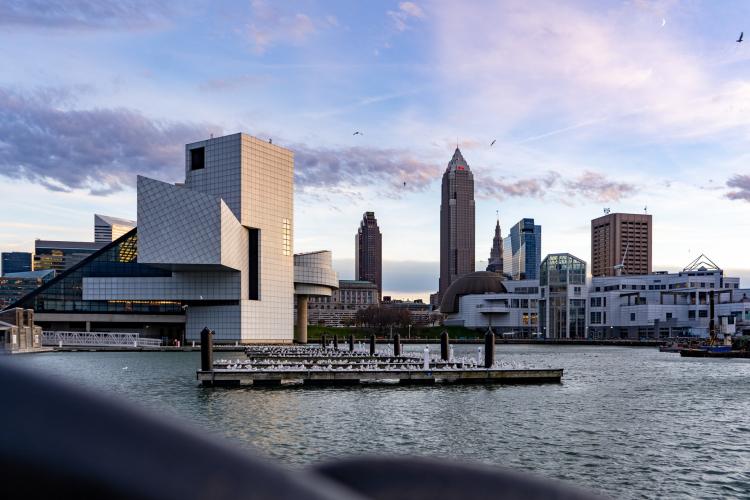
MEEA is producing a blog series to highlight Midwest communities using energy efficiency to progress their climate goals. The first city in the series is Cleveland, Ohio.
Cleveland’s Office of Sustainability was established in May 2005, and it has worked to implement projects, policies and outreach around energy efficiency and green buildings since its inception. In 2009, the Office of Sustainability's lead was promoted to Chief, a cabinet-level position reporting directly to the mayor. In 2018, Cleveland updated its Climate Action Plan (CAP) – which was originally released in 2013 – along with an internal Sustainable Cleveland Municipal Action Plan (SC-MAP). The community-oriented plan’s Energy Efficiency and Green Building focus area sets goals to (1) reduce residential and commercial energy use 50% and industrial use 30% by 2030, and (2) have all large commercial and industrial buildings tracking and managing their energy use by 2023. Cleveland also set a goal to have 100% of its electricity demand supplied by renewable sources by 2050. The objectives in this focus area are as follows:
- Make more homes affordable, comfortable, healthy and energy efficient.
- Prioritize energy efficiency in small and mid-size businesses.
- Support community hubs to be more efficient and resilient.
- Promote new construction and major renovations that meet high green building standards.
Of note, in the 2018 CAP update, the city asserts that “equity [is] the main thread that ties this plan together.” In order to help view climate action through an equity lens, Climate Action Advisory Committee (CAAC) members were supported in taking racial equity training, and an equity and engagement subcommittee was also formed to develop a unique racial equity tool. This tool was used to assess every objective in the CAP for its ability to improve racial equity.
What Cleveland Is Currently Doing
Cleveland has made substantial progress on its energy efficiency and green building goals. For example, it has consistently benchmarked its municipal buildings and it utilizes an energy data management system called EnergyCAP, as well as ENERGY STAR®'s Portfolio Manager, to track its energy use and energy use intensity. Including estimated savings from LED streetlight conversions that were completed for the most part in 2021, Cleveland has saved approximately nine percent of its total municipal energy consumption from a baseline 2010 year, resulting in approximately $3 million in annual avoided utility cost savings.
Cleveland’s Residential Tax Abatement program provides 15-year tax abatement to 100% of the increase in real estate property tax that results from certain improvements on eligible residential/housing projects (remodeling or new construction), or for new construction projects. Residents and developers seeking such tax abatement for residential projects must meet Cleveland Green Building Standards found in the Cleveland Green Building Standard Handbook. Applicants must also select a compliance method: Enterprise Green Communities Criteria, National Green Building Standard established by the National Association of Home Builders or LEED (Silver) Certification. Each method relies on a roster of independent third-party professionals known as Green Raters who then provide assistance and confirm whether the project meets all the necessary standards. Thus far, more than 6,000 units have met these green building standards.
In 2012, the city joined the 2030 Districts Network and the Better Buildings Challenge. The 2030 District is a voluntary benchmarking and reporting program for commercial buildings, currently incorporated in Cleveland’s downtown and University Circle areas. It creates a coalition of building owners, service professionals and community stakeholders that work together to transform the built environment of the city through large-scale reductions in energy use, water use and GHG emissions. The Better Buildings Challenge, created by the U.S. Department of Energy, supports building owners by providing technical assistance and proven solutions for energy efficiency. As part of the challenge, Cleveland has committed to reducing its 2010 building energy usage 20% by 2022 for a minimum portfolio commitment of 4.5 million square feet, and is tracking close to 16% savings as of the 2020 reporting year.
In 2013, Cleveland adopted a Sustainable Municipal Building Policy that requires new municipal construction and major renovations to achieve LEED Silver standards and energy efficiency levels 30% beyond ASHRAE 90.1. The policy also includes efficiency requirements for “Fix it First” projects in existing buildings. It yields savings by efficiently managing energy, water, waste and stormwater at city facilities. The policy requires that green building practices be incorporated into the siting, design, construction, remodeling, repair, maintenance, operation and deconstruction of all city facilities. An updated version of this policy is being released in 2022.
The City of Cleveland also provides financial assistance to CHN Housing Partners, which administers the Home Weatherization Assistance Program (HWAP). In addition to the city, regional utilities and the Department of Energy also provide financial assistance to CHN. CHN Housing Partners’ energy programs provide energy efficiency assistance to income-eligible homeowners and tenants, as well as utility bill payment assistance, thereby lowering the energy and utility burden of low to moderate income residents.
Finally, Cleveland small business owners can join the Greater Cleveland Partnership’s (GCP) Energy Programs to obtain comprehensive energy assessments and access to various utility rebates and incentives.
Cleveland In the Future
Cleveland takes its commitment to climate progress seriously. Not only did the city take the time to track its progress and update its goals in the Climate Action Plan and its internal SC-MAP, but it has taken its goals and objectives and worked towards implementing them in an effective way. The city has also prioritized community engagement and equity throughout the process. These are all details that signify a dedication towards climate leadership. The new administration, under Mayor Justin M. Bibb, is taking a stand for climate action and climate justice, and it will be exciting to see what Cleveland accomplishes next.